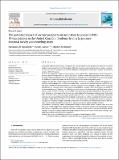Files in this item
The potential impact of vaccine passports on inclination to accept COVID-19 vaccinations in the United Kingdom : evidence from a large cross-sectional survey and modeling study
Item metadata
| dc.contributor.author | de Figueiredo, Alexandre | |
| dc.contributor.author | Larson, Heidi J. | |
| dc.contributor.author | Reicher, Stephen D. | |
| dc.date.accessioned | 2021-11-19T09:30:19Z | |
| dc.date.available | 2021-11-19T09:30:19Z | |
| dc.date.issued | 2021-10 | |
| dc.identifier | 275869719 | |
| dc.identifier | dc020d37-9108-4d84-9135-de349371b09f | |
| dc.identifier | 85117734054 | |
| dc.identifier | 000711661600001 | |
| dc.identifier.citation | de Figueiredo , A , Larson , H J & Reicher , S D 2021 , ' The potential impact of vaccine passports on inclination to accept COVID-19 vaccinations in the United Kingdom : evidence from a large cross-sectional survey and modeling study ' , EClinicalMedicine , vol. 40 , 101109 . https://doi.org/10.1016/j.eclinm.2021.101109 | en |
| dc.identifier.issn | 2589-5370 | |
| dc.identifier.other | RIS: urn:2488332BAE0B656B6260FEBF15FAB550 | |
| dc.identifier.uri | https://hdl.handle.net/10023/24367 | |
| dc.description | This survey was funded by the Merck Investigator Studies Program (MISP). | en |
| dc.description.abstract | Background The UK Government is considering the introduction of vaccine passports for domestic use and to facilitate international travel for UK residents. Although vaccine incentivisation has been cited as a motivating factor for vaccine passports, it is unclear whether vaccine passports are likely to increase inclination to accept a COVID-19 vaccine. Methods We conducted a large-scale national survey in the UK of 17,611 adults between 9 and 27 April 2021. Bayesian multilevel regression and poststratification is used to provide unbiased national-level estimates of the impact of the introduction of vaccine passports on inclination to accept COVID-19 vaccines and identify the differential impact of passports on uptake inclination across socio-demographic groups. Findings We find that a large minority of respondents report that vaccination passports for domestic use (46·5%) or international travel (42·0%) would make them no more or less inclined to accept a COVID-19 vaccine and a sizeable minority of respondents also state that they would ‘definitely’ accept a COVID-19 vaccine and that vaccine passports would make them more inclined to vaccinate (48·8% for domestic use and 42·9% for international travel). However, we find that the introduction of vaccine passports will likely lower inclination to accept a COVID-19 vaccine once baseline vaccination intent has been adjusted for. This decrease is larger if passports were required for domestic use rather than for facilitating international travel. Being male (OR 0·87, 0·76 to 0·99) and having degree qualifications (OR 0·84, 0·72 to 0·94) is associated with a decreased inclination to vaccinate if passports were required for domestic use (while accounting for baseline vaccination intent), while Christians (OR 1·23, 1·08 to 1·41) have an increased inclination over atheists or agnostics. Change in inclination is strongly connected to stated vaccination intent and will therefore unlikely shift attitudes among Black or Black British respondents, younger age groups, and non-English speakers. Interpretation Our findings should be interpreted in light of sub-national trends in uptake rates across the UK, as our results suggest that passports may be viewed less positively among socio-demographic groups that cluster in large urban areas. We call for further evidence on the impact of vaccine certification and the potential fallout for routine immunization programmes in both the UK and in wider global settings, especially those with low overall trust in vaccinations. | |
| dc.format.extent | 10 | |
| dc.format.extent | 942052 | |
| dc.language.iso | eng | |
| dc.relation.ispartof | EClinicalMedicine | en |
| dc.subject | Vaccine passports | en |
| dc.subject | Immunity passports | en |
| dc.subject | SARS-CoV-2 | en |
| dc.subject | Vaccine confidence | en |
| dc.subject | RA0421 Public health. Hygiene. Preventive Medicine | en |
| dc.subject | DAS | en |
| dc.subject | SDG 3 - Good Health and Well-being | en |
| dc.subject.lcc | RA0421 | en |
| dc.title | The potential impact of vaccine passports on inclination to accept COVID-19 vaccinations in the United Kingdom : evidence from a large cross-sectional survey and modeling study | en |
| dc.type | Journal article | en |
| dc.contributor.institution | University of St Andrews. School of Psychology and Neuroscience | en |
| dc.contributor.institution | University of St Andrews. Centre for Research into Equality, Diversity & Inclusion | en |
| dc.contributor.institution | University of St Andrews. St Andrews Sustainability Institute | en |
| dc.identifier.doi | 10.1016/j.eclinm.2021.101109 | |
| dc.description.status | Peer reviewed | en |
| dc.identifier.url | https://www.sciencedirect.com/science/article/pii/S2589537021003898?via%3Dihub#sec0023 | en |
This item appears in the following Collection(s)
Items in the St Andrews Research Repository are protected by copyright, with all rights reserved, unless otherwise indicated.

